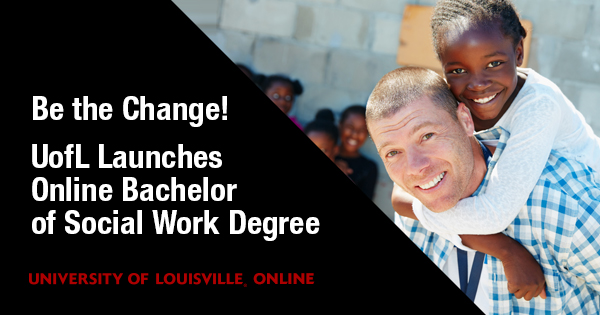Be The Change! UofL Launches Online Bachelor of Social Work Degree

In a time characterized by heightened social activism, growing interest in social justice, and tension surrounding controversial topics like intolerance and economic inequality, the 21st-century social worker’s role is more important than ever. For those longing to make the world a better place, the University of Louisville and Kent School of Social Work are proud to unveil our 100% online Bachelor of Social Work (BSW) starting in fall 2018.
The Bachelor of Social Work prepares students as social work generalists with special attention to issues of social justice. The knowledge and skills gained in the social work program have a broad range of applications in professional settings such as school systems, hospitals, nonprofits, law enforcement, the legal system and government agencies.
Is Social Work a Fit For You?
Think of times of crisis. On the news, you will see first responders, court officials, and lawyers. But less often seen are those important professionals who work in the background supporting those affected. These are the practitioners helping victims cope with tragedy and advocating for those without a voice.
These are social workers – deeply engaged in the most trying issues we face on a daily basis. It’s a role for the strong-hearted, for those who want to spend their career making genuine, tangible changes in the world. If that sounds like you, then social work is worthy of your consideration.
A Primer on the Social Work Industry
“What’s the industry outlook?” you ask.
Great question!
While many complex factors influence the industry, there are a couple significant trends driving much of the demand for social workers.
1) Aging Baby Boomer Population
By 2030, one out of five Americans will be over the age of 65 and it’s estimated the U.S. will need 70,000 social workers who specialize in geriatric care by 2020 – both in-home care and senior living communities. This includes handling cases of age discrimination, loss and end-of-life concerns, substance abuse, depression, and living with physical challenges.
2) Rising Substance Abuse
As the opioid epidemic continues to ravage our towns and cities, there is growing demand for professionals skilled in areas of drug and alcohol addiction counseling. This is in part due to the Affordable Care Act requiring more health insurance plans to cover substance abuse treatment, as well as courts more frequently sentencing participation in a rehabilitation program as opposed to prison.
UofL’s Bachelor of Social Work program offers a Drug and Alcohol Counseling track for students who have been impacted by the struggles associated with addiction and who have a desire help others win their battles with substance abuse.
Employment Outlook as a Social Worker
According to the U.S. Bureau of Labor Services, employment of social workers is expected to grow 12% by 2024 – the national average across all industries is 7%. The median annual salary in 2016 was $46,890.
About UofL’s Online Bachelor of Social Work
The online Bachelor of Social Work comprises 120-121 credit hours. Admission requirements to the BSW program differ depending on whether you’re entering the bachelor’s program as a Lower Division or Upper Division student. BSW graduates potentially qualify to enter the Master of Science in Social Work program with advanced standing which reduces the graduation requirements by half.
Transfer opportunities are available. Up to 60 credit hours may be transferred from a regionally-accredited 2-year college and up to 90 hours from a 4-year college. Your academic history can prepare you to move directly into the Upper Division curriculum.
Kent School is accepting applications now, so apply today to start making a genuine difference in your community!
“The Kent School of Social Work is dedicated to educating and empowering the next generation of social workers by preparing them to be the change they want to see.” – Armon R. Perry, Ph.D., MSW and BSW Director
About UofL Online Learning
The University of Louisville currently offers online programs in various areas of study for adult learners who are not able to come to a physical campus, but want to earn a college degree or certificate and advance their career.
The University of Louisville is a nationally-recognized, metropolitan research university, with a commitment to the liberal arts and sciences, as well as the intellectual, cultural, and economic development of our diverse community of learners.




